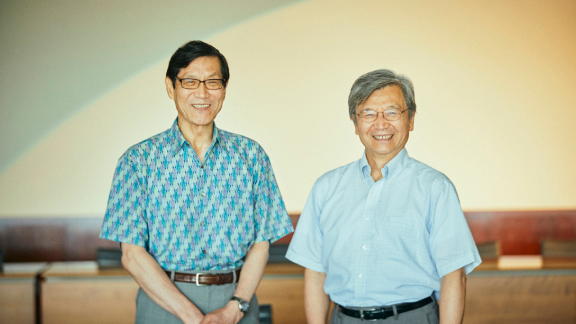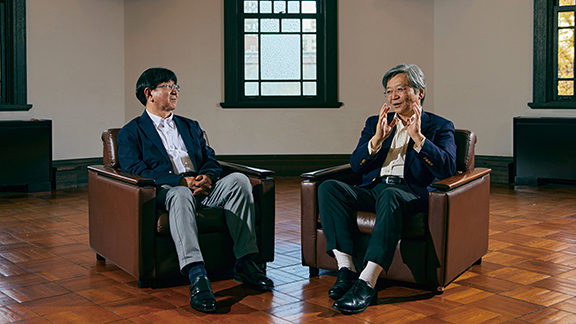Dialogue series Vol.5
The Power of Information Mathematics to Open the Door to a New World
The last in the dialogue series is Professor Hiroshi Imai of the Department of Computer Science, Graduate School of Information Science and Technology, The University of Tokyo. He is active at the cutting edge of the field of information mathematics, and has had various exchanges with President Reine Murata in the run-up to the establishment of the Faculty of Information Mathematics and Science. We asked him once again to discuss the changes in the social situation surrounding the Faculty of Information and Mathematical Sciences and its educational content.
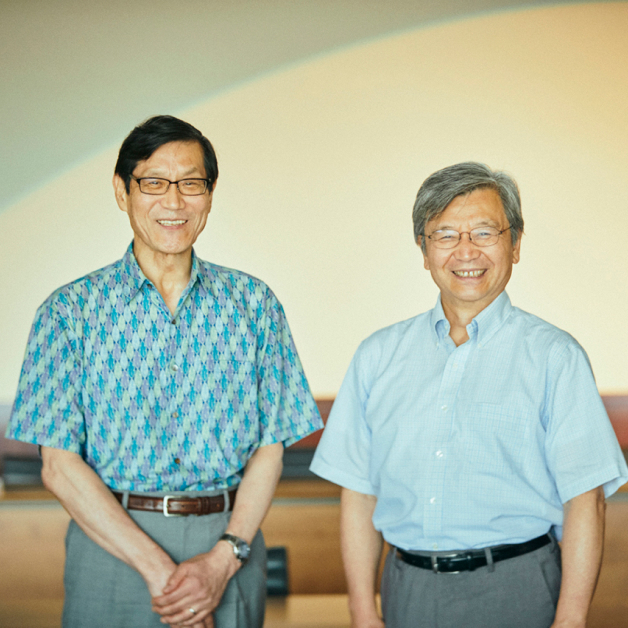
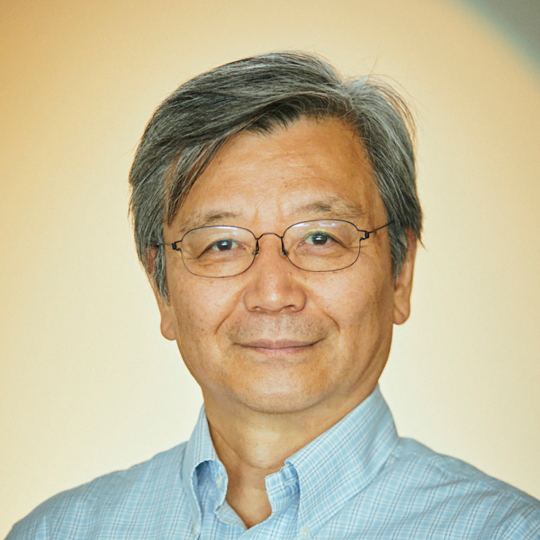
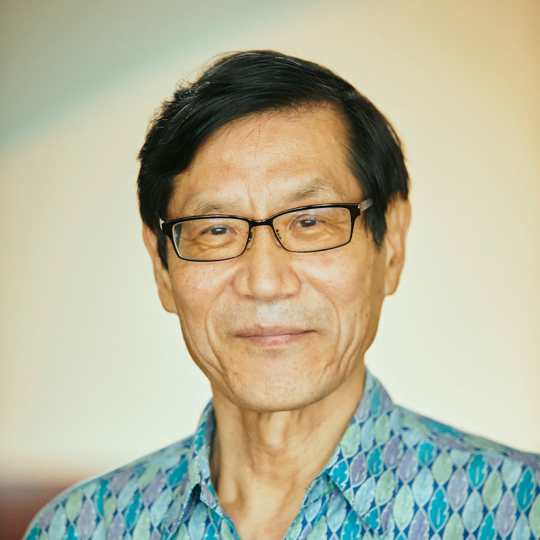
Table of Contents
- No need to fear singularity
- Aim to move from being 'users' of information to 'users' of information.
- Diversity is key to being able to respond to fast-paced, changing times
- The more AI has a personality, the more important it is for us to be 'human'
- The common language of the natural sciences, mathematics, is the foundation, which allows us to transcend language and national barriers.
No need to fear singularity
Since meeting Professor Imai through the introduction of Professor Hiraki, who appeared in the first installment of this dialogue series, we have consulted with him on various matters concerning the direction and educational content of the Faculty of Information Mathematics and Science.
At university, I went on to study a mathematical engineering course in the Department of Mathematical Engineering in the Faculty of Engineering. I was attracted to mathematical thinking, but I was more interested in using mathematical ideas to solve problems than in mathematics itself. Since around 2000, I have been working on quantum computing. Since around 2000, I have extended my research to the world of quantum computers, and am currently continuing my research on quantum computation.
You are truly a front-runner in the world of information mathematics, how do you see recent developments in the world of information?
We live in an era where we are bombarded daily with news about how new technologies in information are impacting society. Most recently, this is the case with ChatGPT, a generative AI that applies machine learning natural language processing, and there is worldwide investment in quantum computers. As for data science, it is recommended in Japan that all university students, regardless of their liberal arts or science backgrounds, should study it. Once again, we are living in an age where people are familiar with the fact that information is the driving force that moves society forward. ChatGPT is currently a major topic of discussion, but we don't know what next year will bring. I have a feeling that this will be a breakthrough and that even bigger trends will emerge.
The arrival of Singularity, when AI surpasses human capabilities, was initially predicted to be around 2045, but Dr Hiraki points out that it will probably be around 2030. Even if it is indeed not that early, it is certainly considerably ahead of schedule. If the Singularity does occur, how will society change?
First, I would like to state that there is no need to fear singularity. I understand that the definition of Singularity is "the ability of a computer's artificial intelligence to develop the equivalent of a human's ability to process information". Some people really believe that computers will transcend humans, but there are still limits. For example, humans can manipulate natural language and move freely, but the energy used to do so is negligible. However, if you want a computer to do the same thing, you need a huge amount of power. The Singularity will certainly arrive in terms of information processing capability alone, but it will not happen to all computers by any means, only to the birth of a different type of machine with such capabilities. However, since such things will be created to enrich society, there is nothing to fear, and I believe it is important to face such a society with sincerity and develop the ability to cope with it.
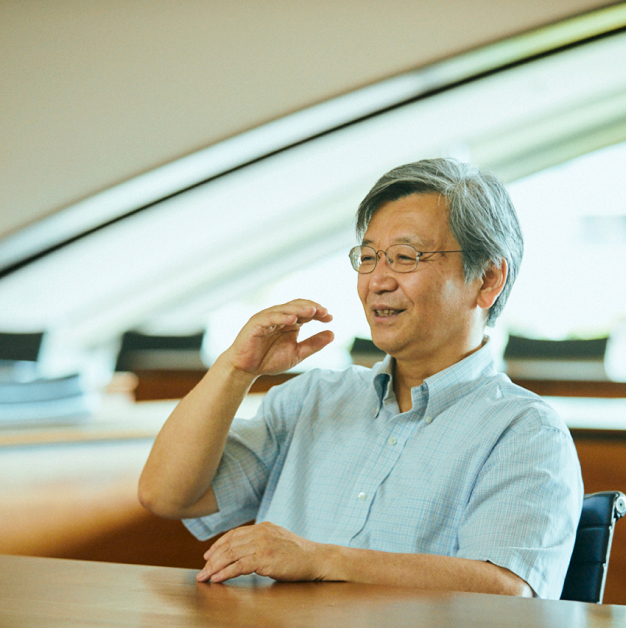
Aim to move from being 'users' of information to 'users' of information.
Meiji Gakuin University is trying to establish a Faculty of Information and Mathematical Sciences in order to nurture people who can play an active role in an era in which AI is rapidly spreading throughout society.
Today, everyone from children to seniors seems to use smartphones. Not long ago, they used to use computers, but nowadays they can do quite a lot with just a smartphone, and some young people only have a smartphone. A smartphone is an information processing machine, but it is only a tool for the user to use. To really master a tool, you need to know what is inside it. That is why it is very important to learn about computers and how they process information during university education. Even for generative AI, it only learns data up to a certain point in time, and it is quite difficult to keep it constantly updated. What university students should be aiming for is to think about information processing that goes beyond familiar devices such as smartphones, and to achieve this it is important to be able to model the target problem properly, programme and run computers, understand the structure of computers, and acquire a background in data science, etc. I think it is important to acquire the ability to model the target problem properly, to programme and run computers, to understand the structure of computers and to acquire data science knowledge.
This is a very important topic, so I will review it. First, you need to be able to think and analyse problems logically, break them down into elements and model them, then you need to understand the engineering mechanisms of computers, including quantum computers, and finally you need to be able to use data science to solve problems, is that correct? Each of these requires a separate set of skills, so it's quite a challenge. In the Faculty of Information Mathematics and Science, there will be three courses in the third and fourth years: the Mathematical and Quantum Information Course, where students learn about theoretical matters; the AI and Data Science Course, where students learn about AI and data science; and the Information Systems and Security Course, where students learn about computers, including their contents. -So it is better to have the three courses intertwined with each other than to have them completely separated.
Ultimately, it would be most desirable to do so, but you can't study everything at university. In the end, I think what you learn at university is to develop the ability to think, and to acquire the necessary background for that. For example, even if you go on to the 'AI and Data Science Course', if you don't know anything about computer systems, information systems and security, you won't be able to make computers work as expected. Moreover, it will probably be five years before the first students graduate; as you can see by comparing 2018 and 2023, there will be very big changes. In other words, it is not enough to study only the present, but it is necessary to hone the ability to conduct research over a long span of time that will be conducive to the future. In this sense, the 'Mathematical and Quantum Information Course' is exactly what we are aiming for. In any case, during the limited four years at university, I would like you to acquire the ability to think logically, in-depth theories and basic knowledge of information mathematics that will enable you to see the future, and the attitude and attitude to work in a team.
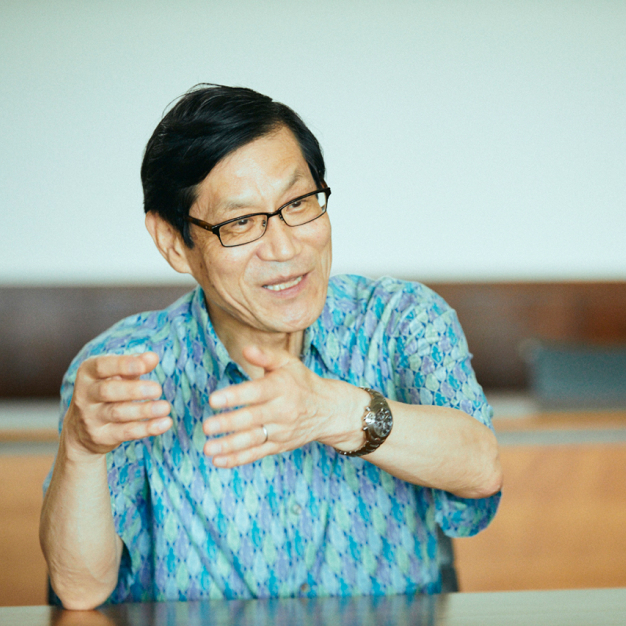
List of articles in dialogue
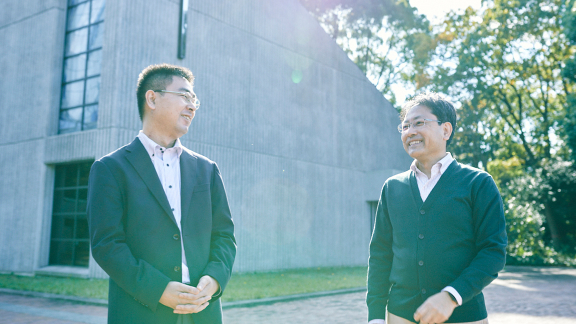 Mr. Irie (Denso) ・ Prof. Ota ed.
Mr. Irie (Denso) ・ Prof. Ota ed. Dialogue Series Vol.2 A future is coming that not even Einstein could have imagined. ― The world of "information" changed by quantum mechanics. From there, the Faculty of Information and Mathematical Sciences learns from a future perspective.
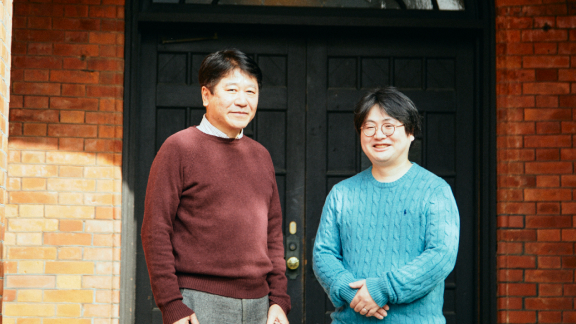 Prof. Kameda and Associate Prof. Inukai, eds.
Prof. Kameda and Associate Prof. Inukai, eds. Dialogue Series Vol.3 Updating the humanities and social sciences with the power of information mathematics! ― Information mathematics is a communication and hub that connects disciplines and people.
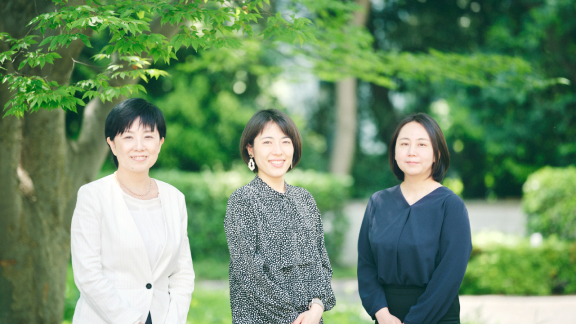 Female Researchers Edition
Female Researchers Edition Dialogue Series Vol.4 A background in informatics and mathematics is the foundation of all science. ― Great Expectations for Integration with Diverse Fields


